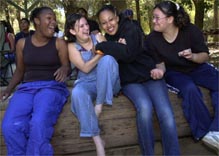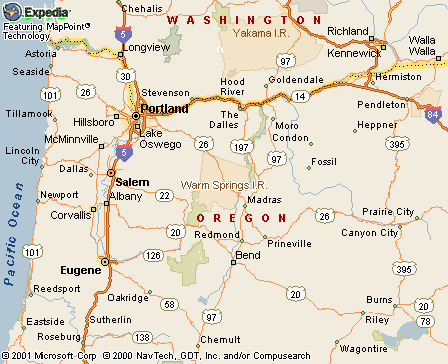|
|
Canku Ota |
|
|
(Many Paths) |
||
|
An Online Newsletter Celebrating Native America |
||
|
July 13, 2002 - Issue 65 |
||
|
|
||
|
Indian Youths Gather for Leadership Camp |
||
|
by Tim O'Leary The
Press-Enterprise
|
||
|
credits: William
Wilson Lewis III/The Press-Enterprise
|
 WARNER
SPRINGS, CA - By ones and twos, some tapping hiking sticks together in
traditional songs, a long line of Indian youths shook off the morning
chill as they climbed Cardiac Hill to a mess hall surrounded by gnarled
oaks. WARNER
SPRINGS, CA - By ones and twos, some tapping hiking sticks together in
traditional songs, a long line of Indian youths shook off the morning
chill as they climbed Cardiac Hill to a mess hall surrounded by gnarled
oaks.
Amid hills covered with granite boulders and chaparral, the air thick with wood smoke, they ate breakfast and learned about respect, culture, inclusion and "stepping up" in their tribes and the wide world beyond. Mottos taped to wooden columns urged camp participants to: "Be heard -- have a voice." "Meet new people." "Be brave." "Keep the fire up." The youths were told that soon, in just a
few years perhaps, they will take their places on tribal councils and
in county, state and federal governments. "We are really counting on you guys to step up and be our leaders," said Vincent Feliz of Bakersfield, a Chumash Indian who was one of the trainers at the weeklong camp believed to be the first of its kind in Southern California. About 110 boys and girls from more than 30 tribes throughout the state attended the camp at the 700-acre Mataguay Boy Scout Reservation near Warner Springs in northern San Diego County. The camp mainly focused on teaching leadership and peacemaking skills to Indian youths from as far away as Oklahoma who are deemed high achievers in their tribes. The camp was sponsored by Indian Dispute Resolution Services Inc., a Sacramento-based nonprofit service that offers training and cultural-awareness programs and mediates disputes among often-contentious Indian tribes, families and political factions. Camp life "It's OK, except we have to sleep in tents," Felicia said as she stripped away the covering of reeds used to make baskets. She said leadership skills are crucial on her reservation near Eureka because relationships between families and political groups are often fractured. "A lot of people in Hupa have enemies," she said. "This leadership camp has a way you can learn to talk to people. It's important because people need to know how to be leaders when they grow up -- to make our land and our people better." For Jim Hornsby, the Indian youth leadership
camp harkened back to the days when distant tribes would gather to peacefully
celebrate the summer solstice before European settlers brought wars,
disease and forced relocations to California. "It's like a village," said Hornsby, a Chumash member who lives on the Pala Indian Reservation in northern San Diego County. "To come here and be connected to their traditions, that's the magic of this kind of camp." He said the decimation of Indian tribes by settlers and soldiers beginning 170 years ago is the hidden cause for the alcoholism, drug abuse and domestic violence that can be found today on reservations. By reflecting on that history, Hornsby said, Indian youths can confront many of the problems that affect their families and tribes. "We're doing an intervention here for something that happened in the 1830s," he said. "Indian history has a lot of grief with it. You get connected with the ancestors and you can deal with that grief." Camp cultural activities included: building and participating in sweat lodges, storytelling, fireside ceremonies, peon games, bird singing and dancing, basketry, making bows and arrows, preparing traditional foods from acorns and making traditional boats from tule reeds that are native to Southern California. 'Culturally intense' Other camp activities included hiking, canoe races, archery, crafts and obstacle courses. About 40 tribal leaders, mentors, elders and spiritual advisers stayed or spoke to the youths ages 14 to 21 during the camp, which ended Friday. This was the third such youth leadership camp held by Resolution Services. Executive Director Steven J. Haberfeld said the agency launched several youth training programs about seven years ago after board members realized the conflict resolution and violence prevention skills they were offering to adults might take root faster among Indian youths. "We thought we could probably reach them better than the adults," he said. Participants from all over Felicitia Payton, 16, of Thermal said the camp taught her leadership skills, let her examine the beliefs of other Indian tribes and allowed her to meet youths from other reservations she may someday visit. It also helped her Indian spirit, she said. "We can go home and be spiritually well and shine on our families," said Felicitia, one of several Desert Cahuilla Indians who participated in the camp. "You have to be spiritually well to be a leader."
|
|
|
||
|
|
||
| Canku Ota is a free Newsletter celebrating Native America, its traditions and accomplishments . We do not provide subscriber or visitor names to anyone. Some articles presented in Canku Ota may contain copyright material. We have received appropriate permissions for republishing any articles. Material appearing here is distributed without profit or monetary gain to those who have expressed an interest. This is in accordance with Title 17 U.S.C. section 107. | ||
|
Canku Ota is a copyright © 2000, 2001, 2002 of Vicki Lockard and Paul Barry. |
||
 |
 |
|
|
The "Canku Ota - A Newsletter Celebrating Native America" web site and its design is the |
||
|
Copyright © 1999, 2000, 2001, 2002 of Paul C. Barry. |
||
|
All Rights Reserved. |
||
